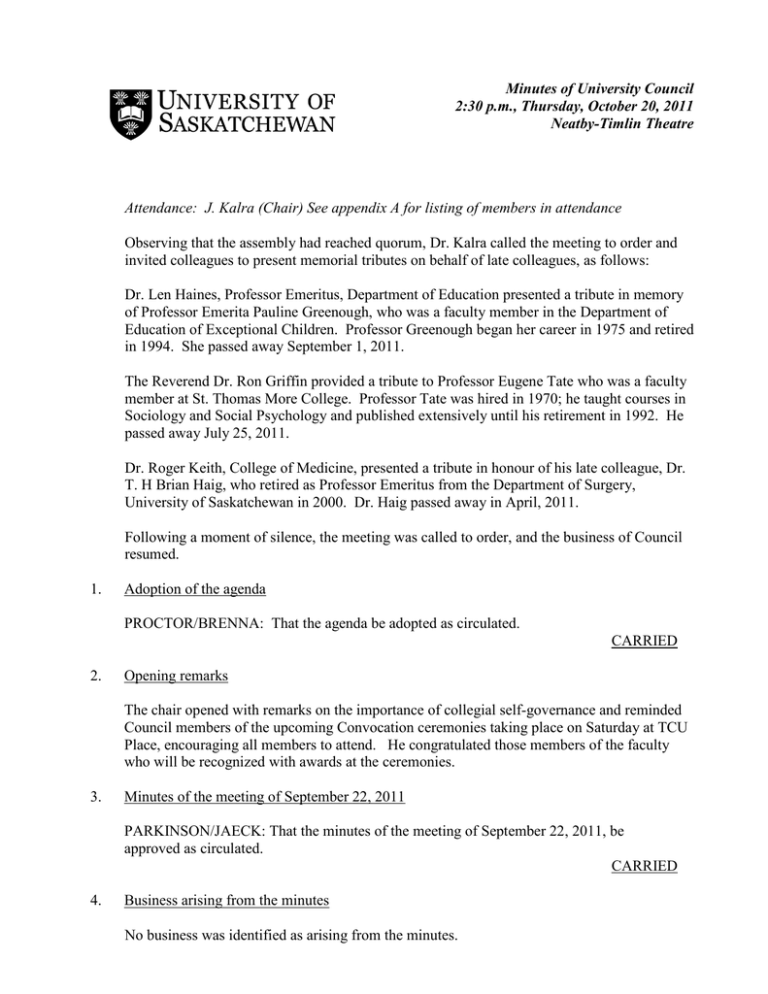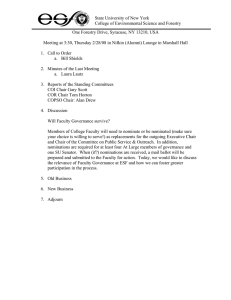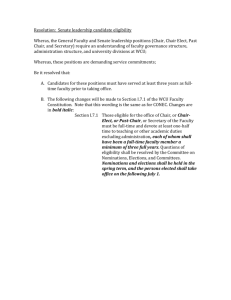Document 12045755
advertisement

Minutes of University Council 2:30 p.m., Thursday, October 20, 2011 Neatby-Timlin Theatre Attendance: J. Kalra (Chair) See appendix A for listing of members in attendance Observing that the assembly had reached quorum, Dr. Kalra called the meeting to order and invited colleagues to present memorial tributes on behalf of late colleagues, as follows: Dr. Len Haines, Professor Emeritus, Department of Education presented a tribute in memory of Professor Emerita Pauline Greenough, who was a faculty member in the Department of Education of Exceptional Children. Professor Greenough began her career in 1975 and retired in 1994. She passed away September 1, 2011. The Reverend Dr. Ron Griffin provided a tribute to Professor Eugene Tate who was a faculty member at St. Thomas More College. Professor Tate was hired in 1970; he taught courses in Sociology and Social Psychology and published extensively until his retirement in 1992. He passed away July 25, 2011. Dr. Roger Keith, College of Medicine, presented a tribute in honour of his late colleague, Dr. T. H Brian Haig, who retired as Professor Emeritus from the Department of Surgery, University of Saskatchewan in 2000. Dr. Haig passed away in April, 2011. Following a moment of silence, the meeting was called to order, and the business of Council resumed. 1. Adoption of the agenda PROCTOR/BRENNA: That the agenda be adopted as circulated. CARRIED 2. Opening remarks The chair opened with remarks on the importance of collegial self-governance and reminded Council members of the upcoming Convocation ceremonies taking place on Saturday at TCU Place, encouraging all members to attend. He congratulated those members of the faculty who will be recognized with awards at the ceremonies. 3. Minutes of the meeting of September 22, 2011 PARKINSON/JAECK: That the minutes of the meeting of September 22, 2011, be approved as circulated. CARRIED 4. Business arising from the minutes No business was identified as arising from the minutes. Council 5. -2- October 20, 2011 Report of the president President MacKinnon echoed the chair’s invitation to all members of Council to attend Convocation ceremonies on Saturday. He reminded Council of the importance to students of seeing their professors at the ceremony. The president then invited questions. A member asked the president for his reaction to the recent Senate meeting and in particular to the motions that were brought forward with respect to corporatization. The president expressed the view that the meeting had gone much as expected; he noted the presence of participants in the Occupy Saskatoon rally and hoped they found the deliberations interesting. He reported that he was critical at both the Senate meeting and in the media of some of the matters raised, but felt that members of Senate had dealt with the matters placed before them in an orderly fashion. The same Council member then reported that a number of Senate members have a created blog under the name of “University of Saskatchewan Senators WOrking to Revive Democracy” (USSWORD) and have received a letter from the university’s solicitor in respect of the infringement of the trademark of the University of Saskatchewan. She suggested that such a letter could be considered an example of the harassment and bullying behaviour that the group has complained about. The president’s response underlined the lack of civility inherent in the ad hominem attacks that this group has directed to the chair of the board of governors; he also questioned the need for a movement to restore democracy to the university, arguing that in his opinion democracy is fully respected within the university and its governing bodies. While lawyers’ letters tend to be direct and clinical, as this one was, the University of Saskatchewan is a registered trademark and the university is obliged and entitled to protect its use. In response to a further comment, the President indicated that all members of the Senate would receive a reply in due course on the matters raised at the Senate meeting. There being no other questions, the chair invited the provost to give his report. 6. Report of the provost Dr. Fairbairn supplemented his written report with an observation that the matters presented in his report represent a huge amount of work by a great many members of the university including many faculty across the campus. The creation of the integrated plan is an important activity in the four-year planning cycle. He also drew Council’s attention to the recent release of the university’s achievement record, in an on-line version only with the richness of drill-down capabilities, and invited members to take time to look at it. 7. Student societies reports 7.1 Report from the USSU Scott Hitchings, president and Kelsey Topola, academic vice-president, presented the USSU report. Scott highlighted recent and current events including the International Day for the Elimination of Poverty, Sexual Assault Week, the Take a Stand Campaign in collaboration with the Indigenous Students Council and the University Learning Centre, the USSU’s fourth annual Green Yourself Week, Ally Promotion Week, and the annual Council -3- October 20, 2011 Trick or Eat event for the food bank. He reported that there will be a forum for the provincial election with candidates from all parties a week from today in Neatby Timlin Theatre. The election results will be shown on election night at Louis’ on a plasma screen. Kelsey reported on the opening of the Teaching Excellence Award nominations; nominations close October 31. 7.2 Report from the Graduate Students’ Association Ehimai Ohiozebau, vice-president operations, presented the GSA report. He reported on a number of activities including a provincial election dialogue in collaboration with Canadian Federation of Students to ensure that student issues are raised during the election; a presentation from the Minister of Advanced Education on immigration reforms and invitations to other parties to present; and a planned workshop on career development in collaboration with the Career Centre. He also reported that a U-PASS for graduate students will be under consideration this month pending the results of consultations with graduate students, and that the GSA is in the process of soliciting proposals for the Health and Dental plan for graduate students. The application process for the GSA bursary, which is offered in collaboration with CGSR, is now closed; about 80 applications for this award have been received. 8. Nominations Committee Dr. Dwayne Brenna presented this report as committee chair. 8.1 Request for decision: Review Committee for Beth Horsburgh, Associate VicePresident Research (Health) and Vice-President Research and Innovation (Saskatoon Health Region) The chair called three times for additional nominations from the floor. There being none, the matter was put to a vote. BRENNA/KROL: That Council approve the following nominations to the Review Committee for the Associate Vice-President Research (Health) and Vice-President Research and Innovation (Saskatoon Health Region). Three members of the General Academic Assembly: Caroline Tait, Native Studies; Indigenous Peoples’ Health Research Centre Nazeem Muhajarine, Community Health and Epidemiology Valerie Verge, Anatomy and Cell Biology CARRIED 9. Planning and priorities committee Dr. Bob Tyler presented this report as committee chair. 9.1 Item for information: Capital Planning and Update on Major Capital Projects Dr. Tyler drew Council members’ attention to the material in the agenda package, noting that this item and the next one were carried over from the previous meeting. He observed Council -4- October 20, 2011 that all members of the university have an interest in capital planning and that it is the practice of the Planning and Priorities committee regularly to bring reports about capital projects to Council. He invited Colin Tennent, Associate Vice-president for Facilities Management and University Architect, to present his slides, which are included as appendix B to the minutes and which give an overview of the last dozen or so years of capital development on the campus, as well as the vision for the next decade. 9.2 Item for information: College Quarter North-East Precinct As part of his presentation on capital plans, Mr. Tennent included a presentation on the plans for the north-east precinct of the College Quarter. This presentation is also included as part of the appendix associated with item 9.1. The chair opened the floor to comments and questions. There were questions about any plans for including a grocery store in the retail section of the development and/or a shuttle service to grocery markets; about the status of funding for the Gordon Oakes Redbear Centre; about the effect of the development on availability of parking spaces and specifically whether the parkade is now paying for itself; about the plans for maintaining or increasing playing field availability; and the effect of next phases of development on the lands currently used by the College of Agriculture and Bioresources for research. The chair thanked Professor Tyler and Mr. Tennent for the presentation. 10. Teaching and Learning Committee Dr. Marcel D’Eon presented this report as committee chair. 10.1 Policy on Academic Accommodation and Access for Students with Disabilities Dr. D’Eon began by pointing out the appropriateness of this policy coming forward during National Disability Employment Awareness Month. He characterized the policy before Council as both ‘the right thing to do’ and also necessary to ensure students are accommodated in accordance with the legal obligation to accommodate. He reminded Council that this policy was presented to Council last year as a request for input and notice of motion and that the committee found the input provided helpful, as was the extensive consultation that has been undertaken over the past year or more. He indicated that one additional change has been suggested as a friendly amendment to the list of definitions in the “Purpose: section. The amendment is to include the following definition of “College”: “For purposes of this policy, the home college for undergraduate students is the college to which the student has been admitted, and for graduate students is the college responsible for the program to which the student has been admitted.” Dr. D’Eon invited Dr. David Hannah, Associate Vice-president for Student Affairs, to present features of the policy. Dr. Hannah’s presentation is attached as an appendix to the minutes. The chair then invited discussion. Professor Zello complimented the framers of the policy on the document, indicating that this university is one of the first to develop such a policy. Council -5- October 20, 2011 He pointed out that the words “access” and “accessibility, as used in the document, may lead readers to think the policy applies to admission requirements. Dr. D’Eon pointed out that essential skills for practice is an area that’s being worked on to define basic requirements for admission in some professional schools and colleges. Dr. Hannah clarified that provincial human rights legislation does not allow a university to discriminate (including for admission) based on a number of factors including disability. The legislation does, however, allow such discrimination if the disability would make it impossible for the individual to complete the requirements of the program. Dr. Hannah acknowledged the presence of David Stack, a representative of McKercher LLP, who has assisted with the development of this policy. Mr. Stack indicated that the question of how far it’s reasonable to modify academic requirements can be a moving target. A set of principles and a dispute resolution process are there because the ability to accommodate without undue hardship is not always clear-cut. He gave as an example a case in which a student could not attend class, where the class itself and the interaction between students that it provided was deemed to be an essential component of the student’s program. The tribunal in that case decided that because the class was an essential academic component, there was no way to accommodate the disability without undue hardship, which is always the test. There were questions and comments about the workload effects of this policy on instructors, about the availability of funding for tutors provided by the provincial government in the form of a grant, about the role of associate deans in cases where more than one course is affected, about the role of accommodation planning committees, and about the responsibility for development of procedures associated with the policy. Dr. Hannah clarified that the definition of ‘undue hardship’ does not mean undue hardship for the instructor but for the University of Saskatchewan, and that the courts and human rights tribunals have set the bar fairly high. Maxine Kinakin, Manager of Disability Services, offered to meet with any college or unit to talk about accommodation planning committees; she will also be meeting with the assistant and associate deans academic. Dr. D’Eon indicated that development of the policy is the proper role of Council, and the procedures (which have been in place since 1997) have been developed by Disability Services; if there are significant changes in light of the new policy, once it is approved by the board, the procedures could be brought to Council for information. The Dean of Graduate Studies and Research observed that faculty members and deans will not have to sort the process out on their own but will have assistance from Disability Services for Students. The motion was then put to a vote. D’EON/PROCTOR: That Council approve the Academic Accommodation and Access for Students with Disabilities Policy and recommend its approval to the Board of Governors. CARRIED 11. Bylaws committee Council -6- October 20, 2011 Dr. Gordon Zello presented the report as chair of the Bylaws Committee. 11.1 Request for input on revisions to Policy on student discipline and appeals Dr. Zello presented this item as a Request for Input and explained the rationale for separating this policy into separate policies, one for appeals and one for discipline. There was a question about whether the academic discipline regulations, and particularly the informal procedures for addressing academic misconduct, were also under review. Dr. Zello responded that the bylaws committee is not reviewing these at this time but that his committee is always willing to entertain discussion about possible changes to the regulations. Dr. Zello reported that the expectation of the committee is to have comments by the end of November and to bring the revisions forward to the January meeting of university Council. He invited comments to be submitted to the bylaws committee through the University Secretary. 11.2 Request for input on revisions to procedures for Student Appeals in Academic Matters This item was also received as a request for input. Dr. Zello explained that the documents have not been presented as side-by-side or track changes documents because of the extensive nature of the revisions. He characterized this as a major revision incorporating input gathered over the course of a year from faculty, students, and staff supporting appeals, and then summarized the nature of the revisions. In addressing a question about the informal procedures, Dr. Zello indicated that it became apparent to the committee that the use of Form A was inconsistent across the campus and confusing to both students and colleges. The committee felt that the informal consultation with the professor could effectively be done without the use of a formal form, and that the first formal step would be a re-read. He also commented on the elimination of the step that would require the bylaws committee to decide whether an appeal should go forward. The chair noted that these documents would come back to Council for approval once feedback has been received and incorporated, and asked that comments be sent to the University Secretary. 12. Policy Oversight Committee 2010-2011 year-end report Professor John Rigby presented this report as one of two Council representatives on this committee. He pointed out that this report is a status update on new and revised policies as of June 30, 2011. 13. Other business No other business was brought forward. Council 14. -7- October 20, 2011 Question period No further questions were raised. 15. Adjournment and next meeting The meeting adjourned at 4:34 p.m. Council next meets on Thursday, November 17, 2011, at 2:30 p.m.



